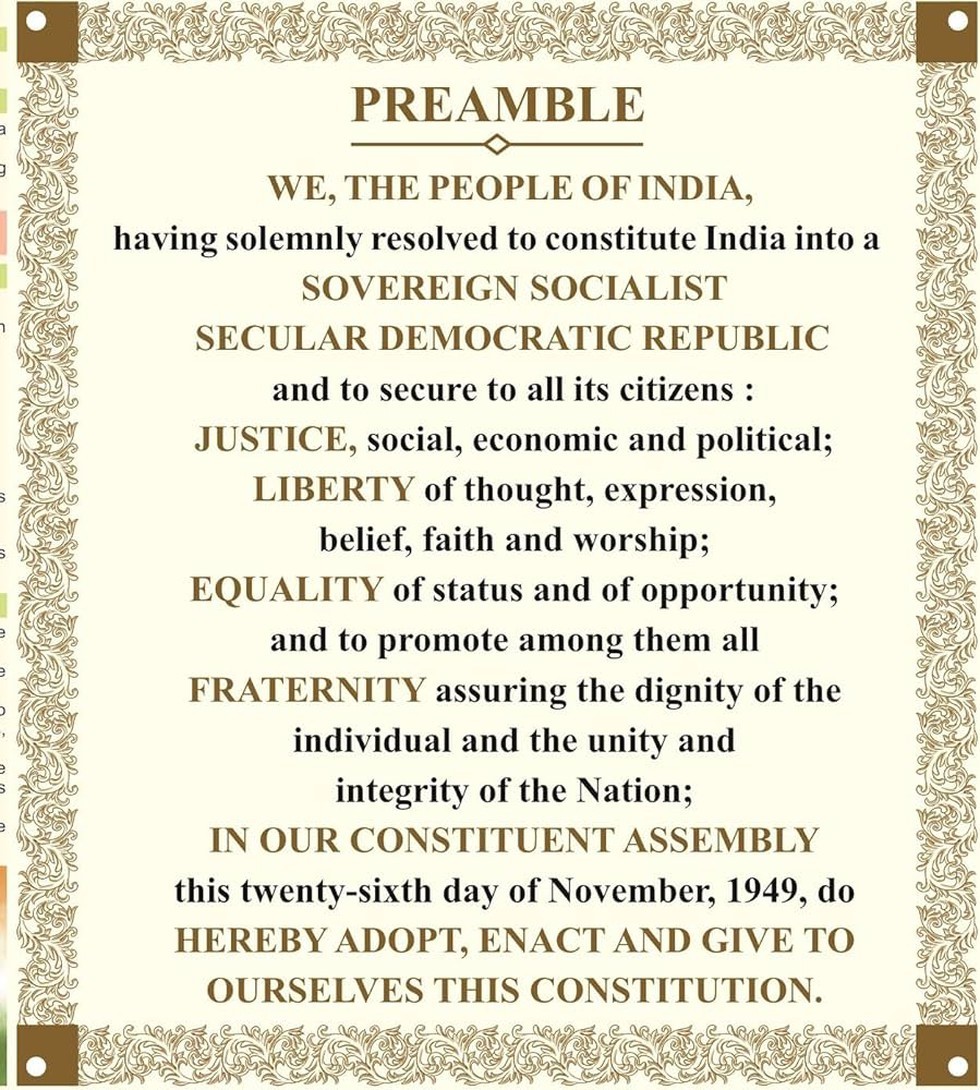
Demand for Amendment in the Preamble of the Constitution of India
Demand for Amendment in the Preamble of the Constitution of India
GS-2: Indian Constitution
(UPSC/State PSC)
Important for Prelims:
Preamble, 42nd Constitutional Amendment, Kesavananda Bharati Case-1973, Berubari Union Case, 1960.
Important for Mains:
Preamble of The Constitution of India, Background, features, Significance, Conclusion.
February 13, 2024
Why in news:
Recently, the Supreme Court questioned whether the 'Preamble' of the Constitution could be amended while retaining the date of its adoption as November 26, 1949.
- In fact, former Rajya Sabha member Subramanian Swamy and lawyer Vishnu Shankar Jain have demanded removal of the words 'socialist' and 'secular' from the preamble.
- The court has expressed the need for detailed discussion on the issue of amendment in the 'Preamble'.
Historical Background of Preamble:
- It is noteworthy that under the 42nd constitutional amendment introduced by the Indira Gandhi government in the year 1976, the words 'socialist' and 'secular' were included in the Preamble of the Constitution.
- This amendment changed India in the Preamble from 'Sovereign, Democratic Republic' to 'Sovereign, Socialist, Secular, Democratic Republic'.
- The phrase “unity of the nation” was replaced with “unity and integrity of the nation”.
- Originally, the text of the Preamble declared India to be a 'sovereign, democratic republic'. The words 'socialist' and 'secular' were added between 'sovereign' and 'democratic'.
- Sovereign: This term means that India has its own independent authority and is not dominated by any other external power. The legislature in the country has the power to make laws which is subject to certain limitations.
- Socialist: This word means achieving socialist goals through democratic means. It believes in a mixed economy where both private and public sectors co-exist.
- Secular: This term means that all religions in India get equal respect, protection and support from the state.
Preamble of the Constitution of India:
- The Preamble of the Indian Constitution is mainly based on the 'Objective Resolution' written by Jawaharlal Nehru in 1946.
- The Preamble of the Constitution of India is a brief introductory statement outlining the guiding principles and aspirations of the nation.
Components of Preamble:
- Source of authority of the Constitution – The Preamble states that the Constitution derives its authority from the people of India.
- Nature of the Indian State – It declares India to be a sovereign, socialist, secular democratic and republican state.
- Objectives of the Constitution – It specifies justice, liberty, equality and fraternity as objectives.
- The concept of ‘Liberty, Equality and Fraternity’ in the Preamble was inspired by the motto of the French Revolution.
Importance of Preamble:
- The Preamble serves as a guide to interpreting the Constitution and making laws.
- It defines the national goals and aspirations of India.
- It emphasizes the importance of fundamental rights and values for all citizens.
- It promotes a sense of national unity and identity.
Is the Preamble part of the Constitution of India:
- In the Berubari Union Case, 1960, the Supreme Court said, the Preamble is not a part of the Constitution.
- But that also said, since the Preamble serves as a key to the mind of our Constitution makers, some help in interpreting any ambiguity in the Constitution can be drawn from the Preamble.
- Kesavananda Bharati Case, 1973: In this judgment, the Supreme Court reversed its stand on the Preamble and made the following observations-
- The Preamble of the Indian Constitution will now be considered a part of the Constitution.
- It will play an important role in the interpretation of laws and various other provisions of the Constitution.
- LIC of India Case, 1995: The Supreme Court once again ruled that the Preamble is an integral part of the Constitution, but it cannot be directly invoked in a court of law in India.
Can the Preamble be amended:
- Another important discussion,- whether the Preamble can be amended under Article 368 or not.
- Kesavananda Bharati Case, 1973: In this case, the Supreme Court held that the Preamble is a part of the Constitution and hence can be amended, provided that no amendment is made to the 'Basic Structure' of the Constitution.
Conclusion:
The Preamble of the Constitution of India is one of the best preambles in terms of ideas and expression among the preambles of the constitutions around the world. The subject of amendment is an issue of consideration because the Preamble of the Constitution serves the purpose of creating an independent nation which protects justice, liberty, equality and fraternity.
Source: The Hindu
------------------------------------------------
Mains Exam Questions:
Highlighting the background, characteristics and importance of the Preamble of the Indian Constitution, write your arguments in support of its amendment.